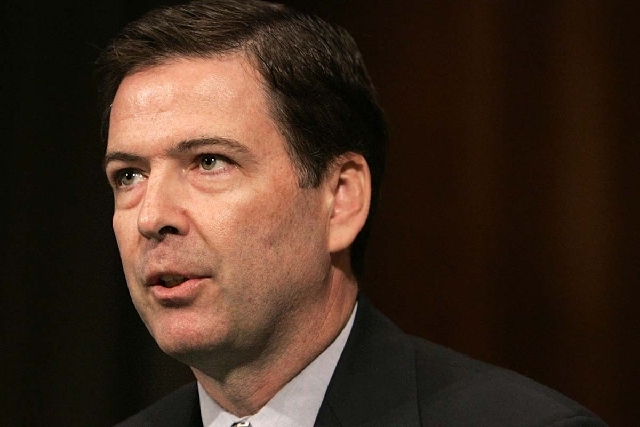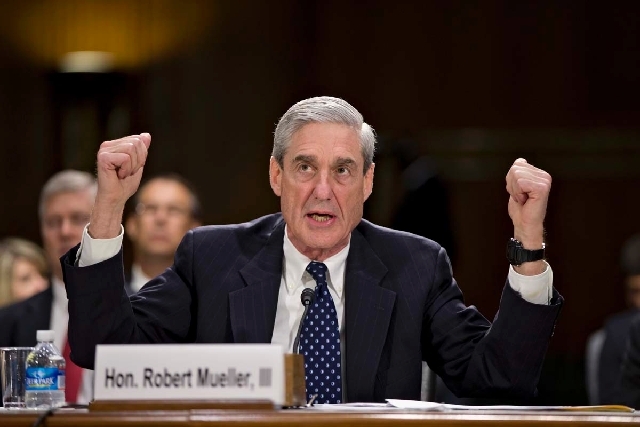Obama nominates Comey as FBI director


WASHINGTON — President Barack Obama nominated James Comey to be the new FBI director Friday, tapping a Bush-era Justice Department official to lead the agency as it grapples with privacy debates over a host of recently exposed investigative tactics.
Obama praised Comey for demonstrating unyielding integrity in the face of uncertainty. Flanked by Comey and his outgoing FBI director, Robert Mueller, in a sunny White House Rose Garden announcement, Obama said Comey recognizes that in times of crisis, America is judged not only by how many plots are disrupted, but also by its commitment to civil liberties and the ideals espoused in the Constitution.
“Jim understands, deeply in his core, the anguish of victims of crime — what they go through,” Obama said. “He’s made it his life’s work to spare others that pain.”
“He’s a rarity in Washington sometimes: He doesn’t care about politics,” Obama added.
Comey is perhaps best-known for a remarkable 2004 standoff at the hospital bedside of Attorney General John Ashcroft over a no-warrant wiretapping program. Comey rushed to the room of his bedridden boss to physically stop White House officials from trying to get an ailing Ashcroft to reauthorize the program.
If confirmed by the Senate, Comey would serve a 10-year term and replace Mueller, who has held the job since the week before the terrorist attacks on Sept. 11, 2001. Obama praised Mueller effusively and said he could declare without equivocation that countless Americans are alive today because of Mueller’s efforts. Mueller is set to resign on Sept. 4 after overseeing the bureau’s transformation into one the country’s chief weapons against terrorism.
“I must be out of my mind to be following Bob Mueller,” Comey said. “I don’t know whether I can fill those shoes, but I know that however I do, I will be truly standing on the shoulders of a giant.”
Comey was a federal prosecutor who served for several years as the U.S. attorney for the Southern District of New York before coming to Washington after the Sept. 11 attacks as deputy attorney general. In recent years, he’s been an executive at defense company Lockheed Martin, general counsel to a hedge fund, board member at HSBC Holdings and lecturer on national security law at Columbia Law School.
The White House may hope that Comey’s Republican background and strong credentials will help him through Senate confirmation at a time when some of Obama’s nominees have been facing tough battles. Republicans have said they see no major obstacles to his confirmation, although he is certain to face tough questions about his hedge fund work and his ties to Wall Street as well as how he would handle current, high-profile FBI investigations.
The FBI is responsible for both intelligence and law enforcement with more than 36,000 employees. It has faced questions in recent weeks over media leak probes involving The Associated Press and Fox News; the Boston Marathon bombings; the attack at Benghazi, Libya, that killed four Americans; and two vast government surveillance programs into phone records and online communications.
The leaker of those National Security Agency programs, former NSA contractor Edward Snowden, also is the subject of an ongoing criminal investigation. And just this week, Mueller revealed the FBI uses drones for surveillance of stationary subjects and said the privacy implications of such operations are worthy of debate.
“This work of striking a balance between our security but also making sure we’re maintaining fidelity to those values that we cherish is a constant mission,” Obama said.
Comey played a central role in holding up Bush’s warrantless wiretapping program, one of the administration’s great controversies and an episode that focused attention on the administration’s controversial tactics in the war on terror.
In dramatic testimony to the Senate Judiciary Committee in 2007, Comey said he thought the no-warrant wiretapping program was so questionable that he refused to reauthorize it while serving as acting attorney general during Ashcroft’s hospitalization. Comey said when he learned that the White House chief of staff Andrew Card and counsel Alberto Gonzales were heading to Ashcroft’s room, despite Ashcroft’s wife’s instructions that there be no visitors, Comey beat them there and watched as Ashcroft turned them away.
“That night was probably the most difficult night of my professional life,” Comey testified. He said he and Ashcroft had reservations about the program’s legality, but he would not discuss details since the program was classified.
Senior government officials had expressed concerns about whether the NSA, which administered the warrantless eavesdropping program, had the proper oversight in place. Other concerns included whether any president possessed the legal and constitutional authority to authorize the program as it was carried out at the time.
Comey was deputy attorney general in 2005 when he unsuccessfully tried to limit tough interrogation tactics against suspected terrorists. He told then-Attorney General Gonzales that some of the practices were wrong and would damage the department’s reputation.
Some Democrats denounced those methods as torture, particularly the use of waterboarding, which produces the sensation of drowning.
Comey’s defiance won him praise from Democrats. In a statement, Senate Judiciary Committee Chairman Patrick Leahy, D-Vt., who will oversee Comey’s confirmation hearing, said, “Mr. Comey showed the kind of independence needed to lead the FBI when he stood up to those in the last administration who sought to violate the rule of law.” Leahy called for senators to give Comey “the swift and respectful confirmation he deserves.”
Sen. Chuck Grassley, the top Republican on the Senate Judiciary Committee, said Comey’s experience on national security would benefit the FBI. “He’s previously dealt with these matters with integrity and shown a willingness to stand his ground if necessary,” Grassley said in a statement. He added that he wants to question Comey on his work in the hedge fund industry and wonders whether he could improve the Obama administration’s efforts to prosecute Wall Street for its role in the economic downturn.
Concerns over Comey were raised by the American Civil Liberties Union, which doesn’t take positions on nominees but is interested in civil liberties issues. ACLU senior policy counsel Mike German said while Comey stood up to some surveillance, he eventually approved the NSA program along with interrogation techniques that included waterboarding, as well as defended the indefinite detention of Jose Padilla, an American terrorism suspect.
“We want to make sure whoever sits in that chair has a determined interest in protecting the rule of law, particularly since they will be there 10 years, outlasting this president and potentially the next president,” German said.
German said these issues are particularly relevant given new revelations about surveillance programs.
As U.S. attorney for the Southern District of New York, Comey headed one of the nation’s most prominent prosecutorial offices and one at the front lines in the fight against terrorism, corporate malfeasance, organized crime and the war on drugs.
As an assistant U.S. attorney in Virginia, Comey handled the investigation of the 1996 bombing of the Khobar Towers housing complex near Dhahran, Saudi Arabia, which killed 19 U.S. military personnel.
He led the Justice Department’s corporate fraud task force and spurred the creation of violent crime impact teams in 20 cities, focusing on crimes committed with guns.
After leaving government in 2005, Comey was senior vice president and general counsel at Lockheed Martin. In 2010, he went to the Westport, Conn.-based hedge fund Bridgewater Associates, before leaving in February.
The White House also said Comey has developed improvements in the military justice system’s performance regarding crimes committed in Iraq and Afghanistan as a member of the Defense Legal Policy Board, which provides independent advice to the defense secretary.
Comey also has taught at the University of Richmond Law School and worked for law firm McGuireWoods LLP, also in Richmond. He has a bachelor’s degree from the College of William & Mary, a law degree from the University of Chicago Law School and clerked for former District Court Judge John M. Walker, Jr. in the Southern District of New York.
———
Follow Nedra Pickler on Twitter at https://twitter.com/nedrapickler
ABOUT JAMES COMEY
AGE-BIRTH DATE — 52; Dec. 14, 1960.
EXPERIENCE — Deputy attorney general, 2003-2005; previously spent 15 years as a federal prosecutor, including as U.S. Attorney for the Southern District of New York; more recently served as general counsel at hedge fund Bridgewater Associates and senior vice president and general counsel at Lockheed Martin; currently a senior research scholar and Hertog Fellow in national security law at Columbia Law School and member of the board of directors at HSBC Holdings.
EDUCATION — Bachelor’s degree, College of William & Mary, 1982; law degree, University of Chicago Law School, 1985.
FAMILY — Wife, Patrice; five children.
QUOTE — “We know that the rule of law sets this nation apart and is its foundation. We also know that we took an oath to support the Constitution of the United States. We know that there may be agonizing collisions between our duty to protect and our duty to that Constitution and the rule of law.”













